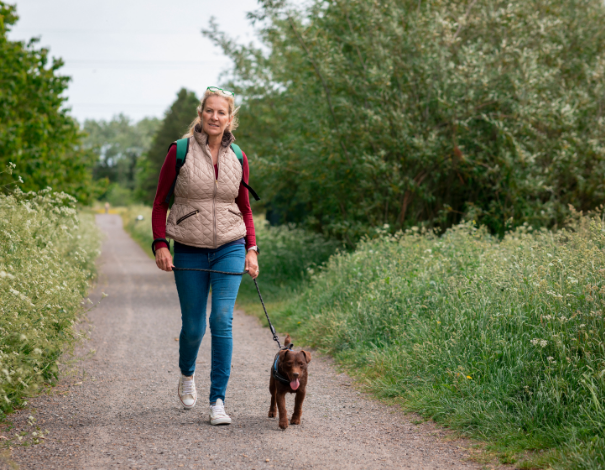Walking the dog outdoors
You may feel ready to get back to some of the healthy habits you had before transplant or start some new ones. Just like before your treatment started, getting exercise and eating well are keys to feeling better and staying as healthy as possible.
Find an exercise routine that keeps you motivated
Regular exercise can help you feel better. Many transplant recipients say they have less pain, more energy and sleep better when they make physical activity part of their day.
“My recovery went a lot better due to exercise. Start as soon as you can and do whatever you can because there’s going to be a tremendous long-term benefit from it,” says David, transplant recipient.
If you haven’t been exercising, talk to your doctor first and follow his or her recommendations. It’s best to start slow and gradually increase your activity level. For example, start with a small goal like walking down the street and back. Then, walk around your neighborhood.
“Once I started walking, I just felt better—physically, emotionally and mentally. It made a huge difference,” says Kay, transplant recipient.
If walking isn’t enjoyable for you, try another aerobic activity, like riding a stationary bike, climbing stairs or even dancing. Once you’ve built up some stamina, try to do aerobic activity for at least 30 minutes a day.
Don’t forget to do strength training and stretching, too. Again, start slow. Even lifting soup cans at first can help to increase your bone density and muscle strength and lower fatigue (tiredness). Gentle stretching and activities like yoga can help you increase your flexibility and are good for your joints.
As you get stronger, you can slowly increase the intensity of your aerobic activity and strength training.
If you’d like some help getting started, ask your doctor for a referral to physical therapy. Physical therapists can help you make an exercise program that’s safe for you and meets your needs. Check with your health insurance company because physical therapy costs might be covered by your policy.
No matter how you get started, find a routine that you enjoy and keeps you motivated.
Find foods you enjoy that are healthy, too
Eating well after transplant is just as important to your health as exercise. It can help control your weight, keep your heart healthy and make you feel better overall.
Since your transplant, you may have been searching for foods that taste good to you. As your taste returns, it’s important that healthy eating habits do, too.
Here are some tips to help you eat healthy:
- Add one vegetable to your dinner each day
- Keep pre-washed and cut vegetables like celery, carrot sticks and peapods in your refrigerator for an easy, healthy snack
- Keep a bottle of water with you and sip on it throughout the day instead of drinking soda
- Stock your refrigerator and cupboards with foods high in vitamin B and C to fight illness, such as broccoli, sweet potatoes, whole grains and oranges
- If you have a sweet tooth, replace candy or other sweets with dried fruit like raisins or cranberries
If your taste is still not what it used to be, try to find foods that you can taste and enjoy, and then expand to similar foods. For example, if you like the orange flavor, oranges and orange juice aren’t your only options. You could also try a smoothie made with orange juice and low-fat vanilla yogurt or have a small scoop of orange sherbet for dessert. Foods with a somewhat bitter taste, like coffee, pizza sauce and chocolate bars, are often the last things that start to taste good again. Substituting less bitter and sweeter versions may help.
If you’re having any problems with eating or your appetite or need tips on healthy eating, a registered dietitian can help. Contact a registered dietitian at your transplant center or another health care organization.
Watch for changes in your body
If you had an allogeneic transplant, tell your doctor about any changes in your body. For example, if you notice you’re not as flexible as you once were or you have any changes in your mouth or throat, don’t wait to see if they’ll get better over time. These changes could be a sign of graft-versus-host disease, which requires quick and early treatment.

